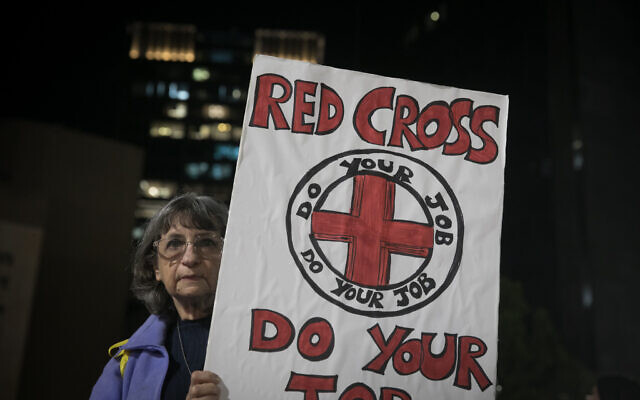



Five truckloads of medicine set to enter Gaza will undergo Israeli security checks, the Defense Ministry said Wednesday evening, after plans for the shipment to enter Gaza without inspection sparked a political headache for Prime Minister Benjamin Netanyahu.
Included in the shipment is long-awaited medicine for Israeli hostages held by Hamas, many of whom rely on prescription drugs for chronic conditions, according to their families, as well as medical supplies, food and other humanitarian aid for Palestinians in the war-torn Gaza Strip, as part of a deal brokered by Qatar and France.
News that the trucks would not be inspected had ignited a firestorm of criticism of Netanyahu, who had reportedly okayed the exception to standard practice, under which any goods entering Gaza are subject to Israeli checks meant to ensure they do not include smuggled arms or other contraband.
Netanyahu initially attempted to distance himself from the decision, but soon after responded to a cacophony of protests from cabinet members and others by ordering the inspections, according to Hebrew media reports.
“Per the directive of the political leadership, five trucks carrying medicine will undergo a security check at the Kerem Shalom crossing,” announced COGAT, a Defense Ministry body that coordinates Palestinian civil affairs
“At the end of the inspection, the trucks will enter the Gaza Strip,” added the Wednesday statement from COGAT, whose full name is the Coordinator of Government Activities in the Territories.
Israel has maintained tight control on deliveries to Gaza since it closed off access to the Strip following the October 7 terror onslaught on southern Israel, in order to prevent Hamas from receiving supplies that could assist its military apparatus as the Israel Defense Forces wages a campaign to wipe the terror group out.
However, on Wednesday morning, senior Hamas official Moussa Abu Marzouk said on X that the shipment of medicine entering under the deal, which was flown from Qatar to Egypt, was approved for entry into Gaza without undergoing an inspection by Israeli authorities.
Reports in Hebrew media that Netanyahu had okayed the procedure were rebutted by the premier’s office, which released a statement that appeared to shift responsibility onto the army.
“The prime minister instructed that the medicines be sent to the hostages but did not deal at all with the security procedures that are set by the IDF and security officials,” the statement read.
According to Channel 12 news, the military claimed it knew nothing about the logistics of the medical aid deal, and only learned that the packages would not be inspected from remarks made by Abu Marzouk.
There was no official statement from the IDF or Defense Ministry on the matter.
Both Netanyahu’s political allies and opposition lawmakers attacked the premier for allowing the aid to enter uninspected and for attempting to pin the issue on the army.
“The responsibility for the decision, as well as for its implementation lies with the political tier — and only us,” war cabinet minister Benny Gantz stated on X.
National Security Minister Itamar Ben Gvir, who leads the far-right Otzma Yehudit Party, slammed Netanyahu for sidestepping his duty, saying that it was his responsibility to order that the shipments undergo inspection.
“Perhaps the technical inspection arrangements are the responsibility of the IDF and the security forces, but the responsibility of the IDF and the security forces to check that the trucks that are supposed to carry medicine for the hostages do not also carry ammunition and equipment for Hamas – is your responsibility and the responsibility of the war cabinet,” he wrote on X.
Opposition lawmaker Avigdor Liberman, head of the opposition Yisrael Beytenu party, demanded that the premier “stop with the bullshit.”
“It’s time you start taking responsibility instead of pushing it all over the place and stop making decisions solely on political considerations,” the hawkish politician said.
The medical aid earmarked for the hostages has been desperately needed since their abduction amid the brutal massacre carried out by Hamas inside Israel, in which some 1,200 people were murdered and nearly 250 were kidnapped, including children and the elderly.
It is believed that 132 hostages abducted by Hamas on October 7 remain in Gaza — not all of them alive — after a weeklong truce in late November that saw 105 women and children released. The captives include men in their 70s and 80s and others with chronic conditions, some of them life-threatening.
The International Committee of the Red Cross, which will distribute the medical aid sent by Qatar, has not gained access to visit the hostages despite urgent appeals from their loved ones and diplomatic officials for them to do so.
The entry of medical aid into Gaza is the first agreement reached by the warring sides since the November deal,. Efforts to negotiate another hostage deal have foundered in the time since.



